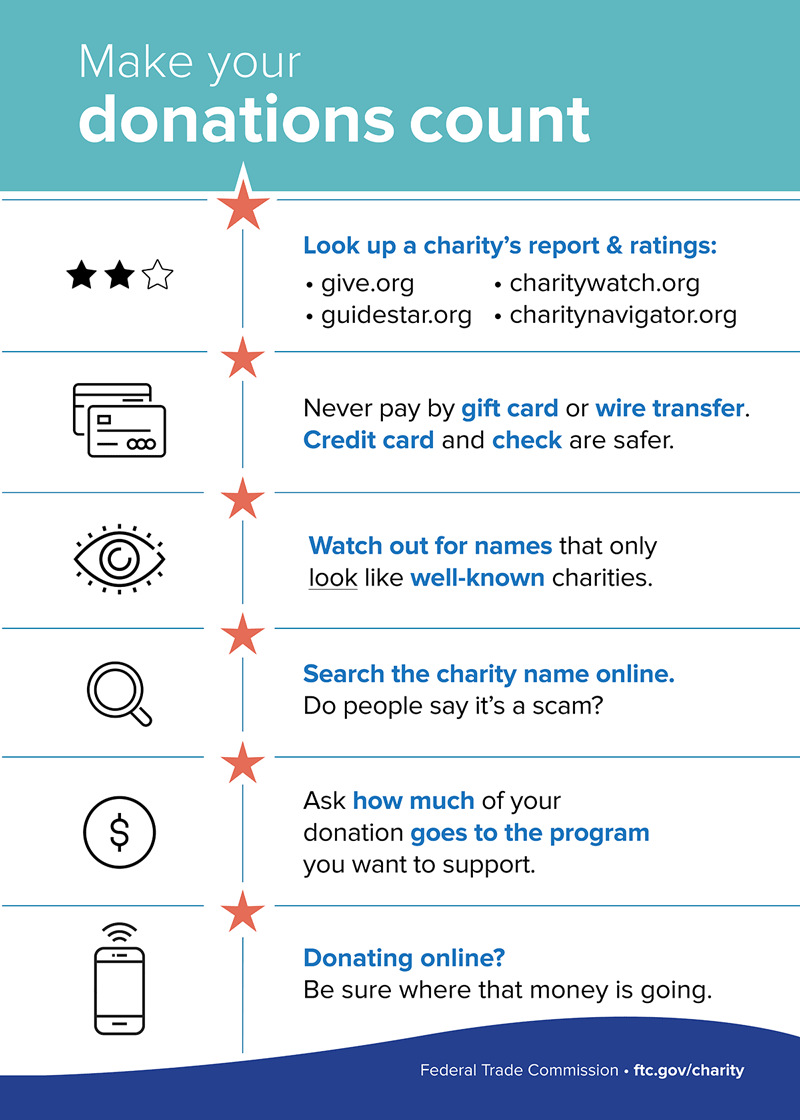Agency and partners to share wise giving tips for consumers during week of October 22-26
The Federal Trade Commission, the National Association of State Charities Officials, and state charities regulators across the country are announcing the first annual International Charity Fraud Awareness Week (ICFAW), between October 22 and 26, 2018. ICFAW is a coordinated international campaign to help charities and consumers avoid charity fraud and promote wise giving. Consumers can follow the week’s events at #CharityFraudOut.
The FTC and its U.S. partners are joining the Charities Commission for England & Wales, which for many years has hosted its own Charity Fraud Awareness Week. This year, the event is expanding to other countries.
In addition to the U.S. participants in ICFAW, the Australian Charities and Not-for-profits Commission, the Charity Commission for Northern Ireland, the New Zealand Charities Service, and the Office of the Scottish Regulator are also joining in the international outreach effort. Key non-governmental participants include Chartered Accountants Worldwide, the UK’s Fraud Advisory Panel, and international charities Oxfam, British Council, and Amnesty International.
“Generous Americans gave more than $286 billion to charity last year. It’s important to raise awareness about charity fraud and promote wise giving, to ensure that consumers’ money goes where it is intended and helps those in need,” said FTC Chairman Joe Simons. “Joining forces with state and international partners makes all of our education efforts more effective.”
To promote awareness of the impact of charity fraud and the importance of wise giving, the FTC is releasing a new video, “Make Your Donations Count.” The video highlights the value of researching charities to avoid donating to a scam, provides tips people can follow to verify the charity before they donate, and directs people to visit FTC.gov/Charity for more information.
ICFAW Social Media Campaign
ICFAW features a social media campaign (on Twitter and Facebook) that promotes wise giving tips focused on particular topics of interest each day.
This year’s campaign will feature tips on the following topics:
- Monday, 10/22: Giving after Natural Disasters
- Tuesday, 10/23: Charitable Solicitations Made via Telemarketing
- Wednesday, 10/24: Privacy
- Thursday, 10/25: Online Giving
- Friday, 10/26: Wise Giving
Follow the FTC’s official Twitter account for daily tips and tune into the weeklong discussion at #CharityFraudOut. Follow the FTC’s official Facebook account for daily tips and links to resources as well.
Many reputable charities are deserving of support. The FTC has tips at www.ftc.gov/charity to help individuals and businesses find those charities and give wisely. Watch our new video, “Make Your Donations Count,” and remember to:
- Look up a charity’s report & ratings.Check them out on sites like the BBB Wise Giving Alliance, Charity Navigator, CharityWatch, and GuideStar.
- Watch out for names that only look like well-known charities. Just because a group has a sympathetic sounding name, or sounds like a well-known organization, doesn’t mean it’s legitimate. Some of the worst offenders have been known to mimic the names of reputable nonprofits.
- Search the charity name online. Are people reporting that it’s a scam?
- Ask how much of your donation really goes to the programs you want to support. Some of the .org charity-rating groups offer an independent assessment.
- Donating online? Be sure where the money is going.
Apart from personal donations, businesses may be approached for charitable contributions, too. Firms also want their donations to go to reputable non-profits, and they want to avoid inadvertently associating the company with a questionable fundraising campaign. The FTC also has specific advice for businesses in Tips for Retailers: How to Review Charity Requests.
- When a firm lends its company name to a charity through a sponsorship or by allowing fundraising on the firm’s property, the company’s reputation is on the line. Customers and members of the community may interpret that as a “stamp of approval” and feel safe to donate to a cause the company is championing. Before lending a business’ name to a charity or allowing solicitations on the premises, find out more about who is doing the asking. The FTC guidance includes a simple form companies can use to get key information from charities seeking support.
The Federal Trade Commission works to promote competition, and protect and educate consumers. You can learn more about consumer topics and file a consumer complaint online or by calling 1-877-FTC-HELP (382-4357). Like the FTC on Facebook, follow us on Twitter, read our blogs, and subscribe to press releases for the latest FTC news and resources.
